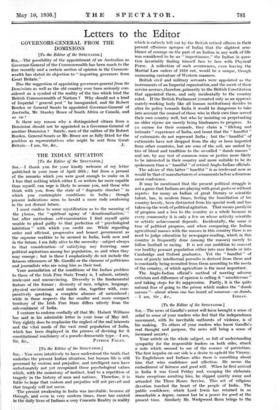[To the Editor of the SPECTATOR.]
Sut,—You seem intuitively to have understood the truth that underlies the present Indian situation, but human life is still governed by custom and prejudice, and intelligent men have unfortunately not yet recognized those psychological values which, with the monotony of instinct, lead to a repetition of tragedy in the history of men and nations. Therefore, it is futile to hope that custom and prejudice will not prevail and that tragedy trill not occur. The present awakening in India was inevitable, because all through, and even in very modern times, there has existed in the daily lives of Indians a very Concrete Reality (a reality which is entirely left out by the British retired officers in their present effusions apropos of India) that the slightest sem- blance of courage on the part of an Indian in any walk of life was considered to be an "impertinence," the Indian in ques- tion invariably finding himself face to face with Physical Force. A collection of such occurrences, even leaving the Martial Law orders of 1919 out, would be a unique, though unamusing caricature of Western manners.
. British civil and military servants were appointed as the instruments of an Imperial organization, and the merit of their service accrues,therefore, primarily to the British Constitution that appointed them, and only incidentally to the country ruled. If the British Parliament (counted only as an approxi- mately-working body like all human institutions) decides to alter its policy towards India it would be dangerous to take into account the counsel of those who in their own time served their own country well, but who by insisting on perpetuating an older regime are merely being hindrances to progress. As an excuse for their counsels, they claim a "lifelong and intimate" experience of India, and taunt that the " handful " of extremists do not represent India ; but the "handful" of extremists have not dropped from the sky or been imported from other countries, but are sons of the soil, are united by ties of blood and tradition to the so-called "dumb masses" and are, by any test of common sense or justice more likely to be interested in their country and more suitable to be its spokesmen than a " handful " of retired Anglo-Indian officials.
The advice of this latter " handful " is as irrelevant now as would be that of manufacturers of armaments before a disarma• ment conference.
It may be mentioned that the present political struggle is not a game that Indians are playing with great gusto or without regrets; for many an Indian of great literary or scientific talent, has, in modern times, feeling the humiliation of his eountry keenly, been distraeted from his special work and has taken up the work of political agitation. Thatineans paraVSis of progress and a loss to the Country as a whole because in every community it is only a few on whose activity scientific or artistic achievement depends.. Incidentally, the same is true of political progress, arid when comparing the Indian agricultural masses with the masses in this country there is no need to judge education by newspaper-reading, which in this Country is frequently done (among the masses) merely to follow football or racing.' It is not our ambition to concert Our healthy peasant population either into race fiends or into Cambridge and Oxford graduates. Yet the " handful " of men of purely intellectual pursuits is derived from them and is constantly being recruited from them according to the needs of the country, of which agriculture is the most important.
The Anglo-Indian official's method ' of meeting adverse criticism and difference of opinion is calling it " mischievous" and taking steps for its suppression. Partly, it is the quite natural fear of going to the prison which Makes the "dumb masses "about whom one has heard ad nauseam—se dumb: —I am, Sir, &c.,






































 Previous page
Previous page